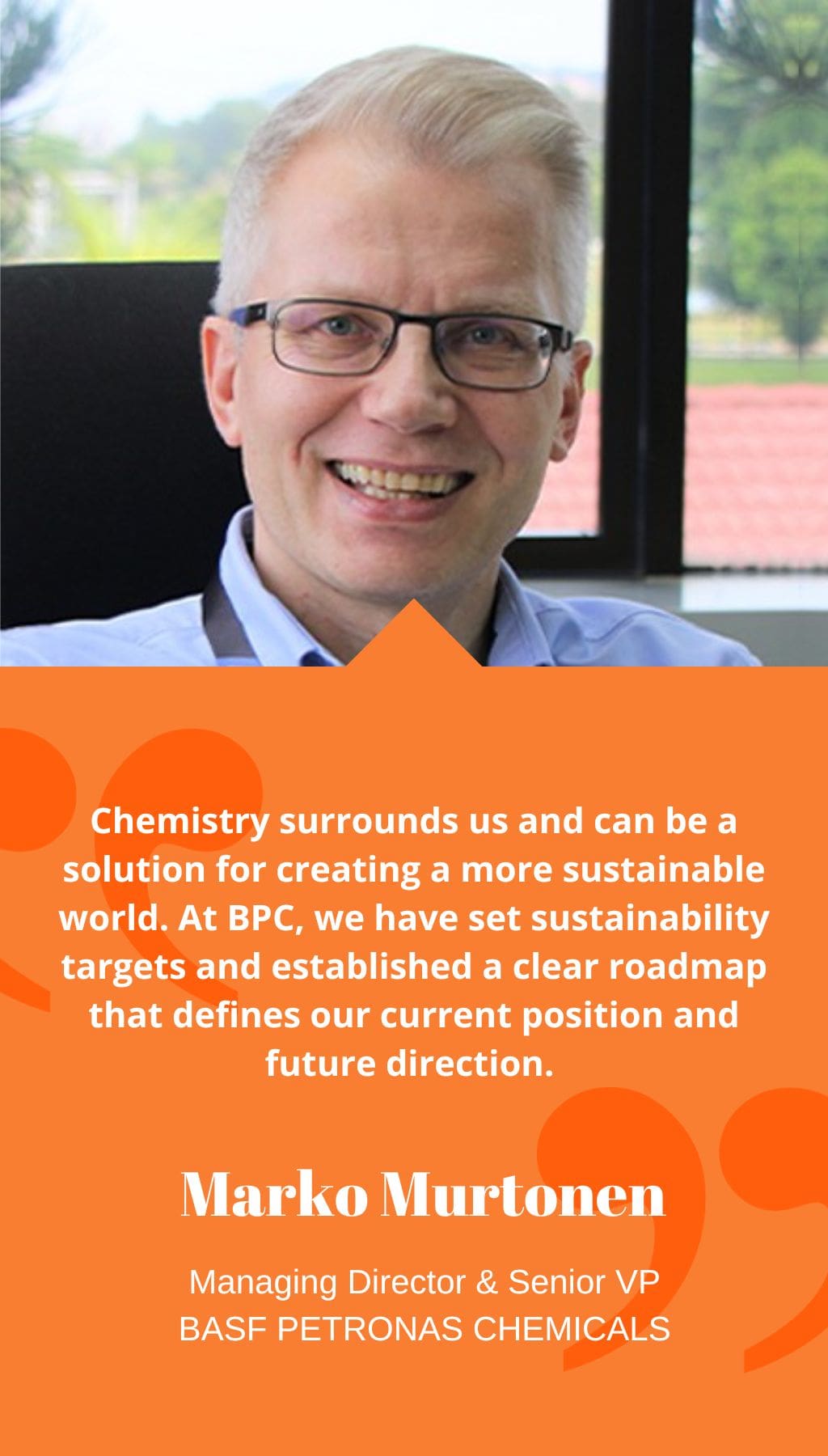
- Malaysia | 11 March 2023

Can you provide an introduction to BASF PETRONAS Chemicals (BPC)?
BPC is a joint venture (JV) that was established 26 years ago, combining the strengths of two chemical giants. BASF, with a 60% ownership, brought its downstream chemicals expertise and global market penetration, while PETRONAS contributed its upstream experience in feedstocks, holding a 40% share. This synergy between feedstocks, customer applications, and market presence has positioned BPC as a leading player in Southeast Asia. Approximately 20% of the products manufactured in Malaysia are sold domestically, while the remaining 80% is exported. BPC serves as the direct marketing arm for products sold within the country, while BASF’s global networks represent us internationally.
Could you provide more details on BPC’s capabilities in Malaysia?
Alongside our corporate office in Bandar Utama, we operate a production facility in Gebeng Industrial Zone, Kuantan. Our site consists of three major complexes: Acrylic Monomers, Oxo Alcohols, and Aroma Ingredients. Within the Acrylic Monomers complex, we primarily produce intermediates for industries such as superabsorbent polymers (SAP), coatings, and adhesives. In the Oxo complex, we supply intermediates to customers in the same industries as well as others, including plasticizers. Our Integrated Aroma Ingredients complex, established in 2017/2018, is the first of its kind outside of Germany. Additionally, we produce highly reactive polyisobutylene (HR-PIB) used in oil additives, high-performance fuels, and lubricant additives. Last year, we announced the expansion of our 2-Ethylhexanoic Acid (2-EHAcid) plant, adding a second line to double its annual production capacity.
How is BPC working towards reducing its Scope 1, 2, and 3 emissions?
Our strategic approach focuses on five fundamental components: Climate Protection, Circular Economy, Positive Social Impact, Water Sustainability, and Responsible Procurement & Supply Chain. One of our key targets is to achieve a 35% reduction in greenhouse gas (GHG) emissions by 2030 compared to 2018 levels, ultimately working towards net-zero emissions by 2050.
We employ various levers as part of our carbon management program to reduce GHG emissions, including initiatives such as Grey to Green, Continuous OpEx, Power to Steam, New CO2 Free Technologies, and Portfolio Readjustment. One notable project currently being implemented is the installation of heat pumps to promote sustainable, affordable, and secure heating. Additionally, we explore the feasibility of incorporating sustainable renewable feedstocks into our Biomass Balance certified products portfolio.
To what extent is digitalization a priority for BPC?
BPC has been engaged in digitalization for several years, spanning from customer interface and logistics, such as GPS tracking and temperature controls for containers, to production processes where we optimize manufacturing through predictive control, artificial intelligence (AI), and augmented reality (AR). The COVID-19 pandemic has accelerated our digital transformation, pushing us to adopt tools that enable remote operations and minimize physical contact between parties.
Do you have a final message to share?
Chemistry surrounds us and can be a solution for creating a more sustainable world. At BPC, we have set sustainability targets and established a clear roadmap that defines our current position and future direction. Currently, we have achieved a 29% reduction in CO2 emissions compared to our target of 35% based on 2018 levels. We continue to work towards carbon neutrality.
However, the industry’s efforts must be complemented by our customers, who can influence the carbon footprint of their products by choosing higher-priced, more sustainable options. As a company, we also need to ensure that our growth is sustainable and carefully evaluate our future investments. For example, the expansion of our 2-Ethylhexanoic Acid (2-EHAcid) plant aligns with our sustainability efforts and considers our business viability in the future.
We are focused on developing our customer base sustainably to maximize productivity. This involves investing in our people and creating optimal working environments. In an industry that may have lost some appeal for the younger generation, we strive to showcase the immense possibilities of chemistry. By collaborating with universities, promoting diversity, and creating a fun and safe workplace, we aim to spark the interest of young individuals in joining this sector. At BPC, we firmly believe that “Chemistry Drives Sustainability.”














